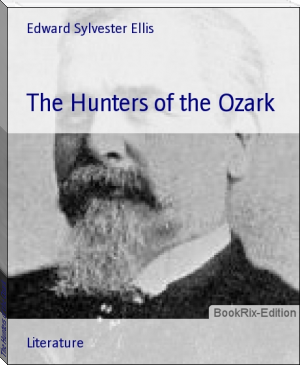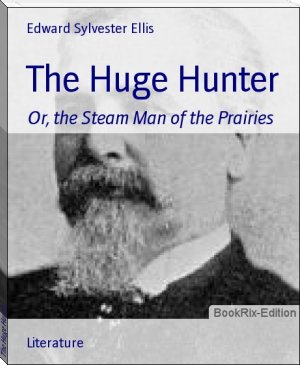The Hunters of the Ozark - Edward Sylvester Ellis (children's ebooks online .txt) 📗

- Author: Edward Sylvester Ellis
Book online «The Hunters of the Ozark - Edward Sylvester Ellis (children's ebooks online .txt) 📗». Author Edward Sylvester Ellis
he hurried back.
"There are plinty of lads about me own size," said he, "but there's only one gun that belongs to me, and if the canoe should upsit and both of us get drowned I want to be sure and save me gun."
Fred smiled at this Irish-like explanation, but he was glad that Terry had left the gun on shore. It was safely hidden until he should wish to get it again, while its presence in the canoe would be the worst kind of encumbrance. The new owner was so charmed with his prize that he would think more of saving that than of saving the boat. It was clear that the task of Terry in fighting off the rushing timber would be almost as difficult as that of guiding it across the swift stream.
"In with you!" said Fred to Terry, who carefully seated himself near the bow of the canoe and took up the long pole that lay in the bottom and projected some distance over the end of the boat. Fred Linden gave it a vigorous shove, landed in the stern, caught up the paddle, and instantly began his struggle.
You will see the difficulty and danger of his task, and must therefore join with me in condemning the lack of judgment showed by both. They had to paddle more than a hundred feet across a furious torrent in which were scores of uprooted trees, wrenched-off limbs, and craggy stumps, all speeding downward with great swiftness and force. The course of the boat being at right angles to these objects, must bring it in collision with some of them, at the great risk of overturning or shattering the canoe, that was not calculated to withstand any such blows.
And yet, though the task was a hard one, there was little doubt that the two lads could make their way across, provided they were given enough time in which to do so; but there were the rapids, so near that their roar was plainly heard. In case of an overturn or accident, the two would be swept among them. It was the same, on a smaller scale, as if a person should start to row across Niagara River, just above the falls, where by vigorous work he could make the passage, provided he did not drop a stroke on the way. You will say that any one making such an attempt placed little value on his own life.
Fred Linden used his paddle after the manner of an Indian--that is, he dipped the broad end first on one side of the boat and then on the other. The paddle was not widened at each end, as is sometimes the case, the one who wields it using the sides alternately and with great rapidity. In calm water such a light structure as an Indian canoe can be driven with great speed, and I have no doubt that the youths would have made a speedy passage had it not been for the interference of the floating objects to which I have referred.
Ten feet from land Fred was forced to back water suddenly to avoid a jagged stump that danced in front like a bull getting ready to charge, and finally did strike the bow with a thump that startled both the occupants.
"Me pole slipped off the side of that," Terry explained, as he brandished the stick in front on the lookout for the threatening waste-wood; "have a care that ye don't drive the boat agin something that is stronger than the boat itsilf."
By coolness, alertness and strength, Fred fought his way in safety until probably one-third of the distance was passed. Then he saw the great blunder he had made in trying to cross while the current was so high. The constant fighting with the floating stumps and trees caused them to lose so much ground--or rather water--that they were drifting frightfully close to the rapids, whose roar grew plainer every moment. But he had gone so far that it was as safe to keep on as to turn back, and so he dipped the paddle and swung it with renewed vigor.
"Look out!" he called to Terry, who in parrying the rush of a stump a couple of yards in advance, did not notice one that was coming broadside on, its presence betrayed by a tiny branch that protruded a few inches above the surface like the fin of a shark. Fred did his utmost to avoid it, but he was too slow, and a second later the pointed log not only struck the side of the canoe, but capsized it.
CHAPTER X.
A STRUGGLE FOR LIFE.
The partly sunken log crashed into the side of the canoe with such suddenness that the craft was overturned and ruined, and the occupants struggling in the water, before either had time to utter more than a single exclamation.
But they were powerful swimmers, and, but for the nearness of the rapids, they could have afforded to laugh at their mishap. As it was, Terry Clark shouted, as he blew the muddy water from his mouth:
"What a sinsible young gintleman I was to lave me gun on the other side."
"We both would have been much more sensible had we left ourselves there," rejoined Fred, who was struggling with might and main for the land in front; "there's no time, Terry, to waste in talk; we've got to swim as never before, for nothing else will save us."
The other seemed to rouse to his peril, for he made the only wise response he could--which was putting forth every atom of strength and skill that he possessed in the effort to breast the furious torrent.
It is singular how often the slightest advantage turns the scale for life or death. At the moment the canoe was smashed and capsized Terry Clark was seated some six or eight feet nearer the shore toward which they were paddling than was Fred Linden, and this difference remained when the two went into the water and began swimming. The Irish lad was fully as skillful as the other, and he did not lose an inch of the gain thus given him.
They were near the middle of the stream when the catastrophe took place. Of course they would have done better had they been without any clothing, but there was no time to remove any of that, and beyond question the two made the most gallant kind of a fight for life.
Fully aroused to his peril, Terry swam with amazing power, his lips compressed and his eyes fixed on the land in front, which seemed quite near, and yet was never so hard to reach. The lad had proven by repeated tests that he could swim faster on his left side then in any other position. He quickly flung himself over and used his arms and legs like one who knew fully the stake for which he was contending.
By this recourse he actually gained on Fred, who continued to breast the water with all the strength at his command. Terry was hopeful, and now that he was fully roused, he did not waste his strength in shouting to his companion. As he advanced in his crab-like fashion, he frequently flirted his face around so as to look in front, and thus to keep aware of his progress.
"I'm doing well, and will make it," was his thought; "I hope Fred will be as fortynate as mesilf."
An important point was gained by swimming on his left side; his face was turned up stream, and he caught sight of the floating timber quicker than when advancing with his face toward the land. Thus it came about that he saw a plunging tree, or log, similar to that which had destroyed the canoe, and when it was fully as close to him.
Like a flash, Terry dove, intending to pass clean under it. He could not know any thing about the portion beneath the surface, and was a little startled when he found himself among leaves and a lot of small branches; but he swam with the same vigor and skill when below as when above the surface, and quickly fought his way through, rising on the other side a considerable distance nearer land.
But he gasped with terror, for during the brief period he lost a great deal more than he gained. A furtive glance to the left showed him the mist and spray flying high in air, as the muddy waters were tossed to and fro by the rocks below: he was fearfully close to them.
But he was also close to land, and he saw his chance; indeed, his only one. A tree growing out toward the creek curved downward so that the lower part of the trunk was within a few inches of the water. A short time before the current had washed against it, but was now falling away from it.
The portion which inclined downward like a bow was several feet from shore, and some distance below him. It will be seen, therefore, that the thing for him to do was to bend all his efforts toward reaching that. If he could advance far enough to allow the current to sweep him beneath, or quite close to the tree, he could grasp it and save himself.
"That's what's got to be done," was his conclusion the instant he saw the crooked tree; "or it's good-by to Terry Clark and his rifle."
He would succeed; he saw it the next moment. The curving tree seemed to be sweeping up stream with frightful swiftness, but at the right second Terry, by a supreme effort, threw himself partly out of the water, and flinging both arms around the trunk, which was no more than six inches in diameter, he held fast.
The strain was great, and he felt his fingers slipping over the shaggy bark, but he held on like grim death, and by a skillful upward hitch of his body, locked his fingers above the trunk, and was safe; he was then able to hold double his own weight.
His next move was to throw his feet around the trunk, when it was an easy matter for him to twist himself over on top, where he was as secure as lying on his own trundle bed in the cabin at home.
The instant his own safety was secured his whole soul was stirred by anxiety for Fred Linden, who, he knew, was placed at more disadvantage than he. Since he was further from shore than was he, and since the latter had been able to save himself only by a hair's breadth, it was clearly beyond the power of Fred to escape in the same manner--though it might be that there was some other remote chance for him.
The first glance that Terry cast over the muddy waters showed him his friend, swimming manfully for shore, but so far out in the stream that it was impossible for him to reach it before passing into the grip of the rapids.
"It's no use," called out Fred, in a voice in which there was no tremor or shrinking; "I'm bound for the rapids, and here goes."
And deliberately facing about, he swam coolly in the direction of the boiling waters as though he were bathing in a still lake.
"Be the powers, but he is plucky," muttered Terence, thrilled by the sight; "if he can get through there alive, I'll be proud of him!"
The rapids, of which I have made mention several times, were caused by a series of irregular rocks, extending a hundred yards, in the space
"There are plinty of lads about me own size," said he, "but there's only one gun that belongs to me, and if the canoe should upsit and both of us get drowned I want to be sure and save me gun."
Fred smiled at this Irish-like explanation, but he was glad that Terry had left the gun on shore. It was safely hidden until he should wish to get it again, while its presence in the canoe would be the worst kind of encumbrance. The new owner was so charmed with his prize that he would think more of saving that than of saving the boat. It was clear that the task of Terry in fighting off the rushing timber would be almost as difficult as that of guiding it across the swift stream.
"In with you!" said Fred to Terry, who carefully seated himself near the bow of the canoe and took up the long pole that lay in the bottom and projected some distance over the end of the boat. Fred Linden gave it a vigorous shove, landed in the stern, caught up the paddle, and instantly began his struggle.
You will see the difficulty and danger of his task, and must therefore join with me in condemning the lack of judgment showed by both. They had to paddle more than a hundred feet across a furious torrent in which were scores of uprooted trees, wrenched-off limbs, and craggy stumps, all speeding downward with great swiftness and force. The course of the boat being at right angles to these objects, must bring it in collision with some of them, at the great risk of overturning or shattering the canoe, that was not calculated to withstand any such blows.
And yet, though the task was a hard one, there was little doubt that the two lads could make their way across, provided they were given enough time in which to do so; but there were the rapids, so near that their roar was plainly heard. In case of an overturn or accident, the two would be swept among them. It was the same, on a smaller scale, as if a person should start to row across Niagara River, just above the falls, where by vigorous work he could make the passage, provided he did not drop a stroke on the way. You will say that any one making such an attempt placed little value on his own life.
Fred Linden used his paddle after the manner of an Indian--that is, he dipped the broad end first on one side of the boat and then on the other. The paddle was not widened at each end, as is sometimes the case, the one who wields it using the sides alternately and with great rapidity. In calm water such a light structure as an Indian canoe can be driven with great speed, and I have no doubt that the youths would have made a speedy passage had it not been for the interference of the floating objects to which I have referred.
Ten feet from land Fred was forced to back water suddenly to avoid a jagged stump that danced in front like a bull getting ready to charge, and finally did strike the bow with a thump that startled both the occupants.
"Me pole slipped off the side of that," Terry explained, as he brandished the stick in front on the lookout for the threatening waste-wood; "have a care that ye don't drive the boat agin something that is stronger than the boat itsilf."
By coolness, alertness and strength, Fred fought his way in safety until probably one-third of the distance was passed. Then he saw the great blunder he had made in trying to cross while the current was so high. The constant fighting with the floating stumps and trees caused them to lose so much ground--or rather water--that they were drifting frightfully close to the rapids, whose roar grew plainer every moment. But he had gone so far that it was as safe to keep on as to turn back, and so he dipped the paddle and swung it with renewed vigor.
"Look out!" he called to Terry, who in parrying the rush of a stump a couple of yards in advance, did not notice one that was coming broadside on, its presence betrayed by a tiny branch that protruded a few inches above the surface like the fin of a shark. Fred did his utmost to avoid it, but he was too slow, and a second later the pointed log not only struck the side of the canoe, but capsized it.
CHAPTER X.
A STRUGGLE FOR LIFE.
The partly sunken log crashed into the side of the canoe with such suddenness that the craft was overturned and ruined, and the occupants struggling in the water, before either had time to utter more than a single exclamation.
But they were powerful swimmers, and, but for the nearness of the rapids, they could have afforded to laugh at their mishap. As it was, Terry Clark shouted, as he blew the muddy water from his mouth:
"What a sinsible young gintleman I was to lave me gun on the other side."
"We both would have been much more sensible had we left ourselves there," rejoined Fred, who was struggling with might and main for the land in front; "there's no time, Terry, to waste in talk; we've got to swim as never before, for nothing else will save us."
The other seemed to rouse to his peril, for he made the only wise response he could--which was putting forth every atom of strength and skill that he possessed in the effort to breast the furious torrent.
It is singular how often the slightest advantage turns the scale for life or death. At the moment the canoe was smashed and capsized Terry Clark was seated some six or eight feet nearer the shore toward which they were paddling than was Fred Linden, and this difference remained when the two went into the water and began swimming. The Irish lad was fully as skillful as the other, and he did not lose an inch of the gain thus given him.
They were near the middle of the stream when the catastrophe took place. Of course they would have done better had they been without any clothing, but there was no time to remove any of that, and beyond question the two made the most gallant kind of a fight for life.
Fully aroused to his peril, Terry swam with amazing power, his lips compressed and his eyes fixed on the land in front, which seemed quite near, and yet was never so hard to reach. The lad had proven by repeated tests that he could swim faster on his left side then in any other position. He quickly flung himself over and used his arms and legs like one who knew fully the stake for which he was contending.
By this recourse he actually gained on Fred, who continued to breast the water with all the strength at his command. Terry was hopeful, and now that he was fully roused, he did not waste his strength in shouting to his companion. As he advanced in his crab-like fashion, he frequently flirted his face around so as to look in front, and thus to keep aware of his progress.
"I'm doing well, and will make it," was his thought; "I hope Fred will be as fortynate as mesilf."
An important point was gained by swimming on his left side; his face was turned up stream, and he caught sight of the floating timber quicker than when advancing with his face toward the land. Thus it came about that he saw a plunging tree, or log, similar to that which had destroyed the canoe, and when it was fully as close to him.
Like a flash, Terry dove, intending to pass clean under it. He could not know any thing about the portion beneath the surface, and was a little startled when he found himself among leaves and a lot of small branches; but he swam with the same vigor and skill when below as when above the surface, and quickly fought his way through, rising on the other side a considerable distance nearer land.
But he gasped with terror, for during the brief period he lost a great deal more than he gained. A furtive glance to the left showed him the mist and spray flying high in air, as the muddy waters were tossed to and fro by the rocks below: he was fearfully close to them.
But he was also close to land, and he saw his chance; indeed, his only one. A tree growing out toward the creek curved downward so that the lower part of the trunk was within a few inches of the water. A short time before the current had washed against it, but was now falling away from it.
The portion which inclined downward like a bow was several feet from shore, and some distance below him. It will be seen, therefore, that the thing for him to do was to bend all his efforts toward reaching that. If he could advance far enough to allow the current to sweep him beneath, or quite close to the tree, he could grasp it and save himself.
"That's what's got to be done," was his conclusion the instant he saw the crooked tree; "or it's good-by to Terry Clark and his rifle."
He would succeed; he saw it the next moment. The curving tree seemed to be sweeping up stream with frightful swiftness, but at the right second Terry, by a supreme effort, threw himself partly out of the water, and flinging both arms around the trunk, which was no more than six inches in diameter, he held fast.
The strain was great, and he felt his fingers slipping over the shaggy bark, but he held on like grim death, and by a skillful upward hitch of his body, locked his fingers above the trunk, and was safe; he was then able to hold double his own weight.
His next move was to throw his feet around the trunk, when it was an easy matter for him to twist himself over on top, where he was as secure as lying on his own trundle bed in the cabin at home.
The instant his own safety was secured his whole soul was stirred by anxiety for Fred Linden, who, he knew, was placed at more disadvantage than he. Since he was further from shore than was he, and since the latter had been able to save himself only by a hair's breadth, it was clearly beyond the power of Fred to escape in the same manner--though it might be that there was some other remote chance for him.
The first glance that Terry cast over the muddy waters showed him his friend, swimming manfully for shore, but so far out in the stream that it was impossible for him to reach it before passing into the grip of the rapids.
"It's no use," called out Fred, in a voice in which there was no tremor or shrinking; "I'm bound for the rapids, and here goes."
And deliberately facing about, he swam coolly in the direction of the boiling waters as though he were bathing in a still lake.
"Be the powers, but he is plucky," muttered Terence, thrilled by the sight; "if he can get through there alive, I'll be proud of him!"
The rapids, of which I have made mention several times, were caused by a series of irregular rocks, extending a hundred yards, in the space
Free e-book «The Hunters of the Ozark - Edward Sylvester Ellis (children's ebooks online .txt) 📗» - read online now
Similar e-books:





Comments (0)